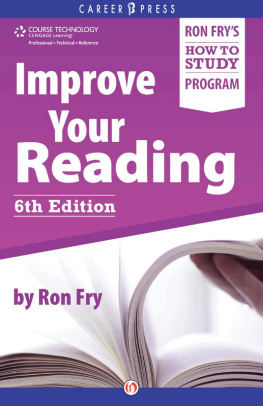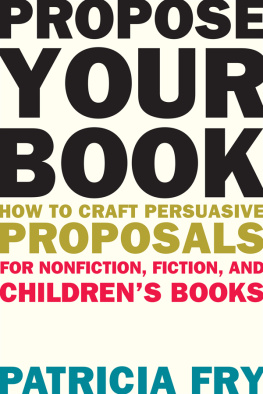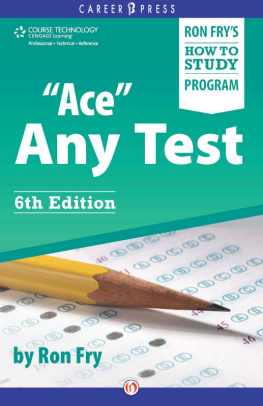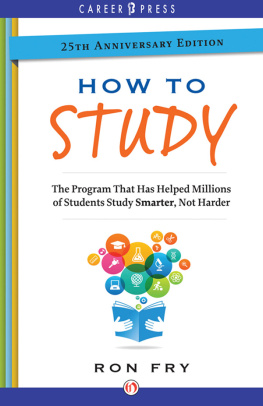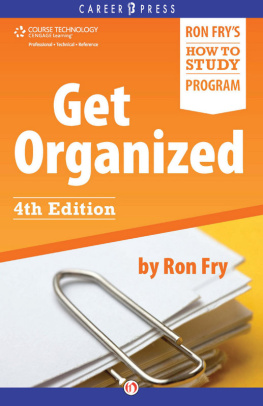
IMPROVE YOUR READING
SIXTH EDITION
Ron Fry

CONTENTS
FOREWORD
READ ON!
A number of you are students, not just the high school students I always thought were my readers, but also college students making up for study skills you may have lacked in high school, and middle school students trying to master these study skills early in your educational career to maximize your opportunities for success.
If youre a high school student, you should be particularly comfortable with both the language and format of this bookits relatively short sentences and paragraphs, occasionally humorous (hopefully) headings and subheadings, and a reasonable but certainly not outrageous vocabulary. I wrote it with you in mind!
If youre a middle school student, I doubt youll have trouble with the concepts or language in this book. Sixth, seventh, and eighth grade is the perfect time to learn the different ways to read and the methods to better retain whatever youre reading. Youre probably just discovering that The Babysitters Club series is not what your parents or teachers had in mind when they encouraged you to read the classics.
And if you are a traditional college student, age 18 to 25, I would have hoped that you had already mastered most, if not all, of the basic study skills, especially reading and writing. Since you havent, please make learning, using, and mastering all of the study skills covered in my How to Study Program an absolute priority.
Do not pass Go. Do not go on a date. Take the time to learn these skills now. You may have been able to kid yourself that mediocre or even poor reading skills didnt stop you from finishing, perhaps even succeeding in, high school. I guarantee you will not be able to kid anyone in college. You must master all of the skills in this book to survive, let alone succeed.
If You Finished School Long Ago
Many of you reading this are adults. Some of you are returning to school, and some of you are long out of school but have figured out that if you can learn now the study skills your teachers never taught you, youll do better in your careersespecially if you are able to read what you need to fasterand retain it better and longer.
All too many of you are parents with the same lament: How do I get Johnny to do better in school? He thinks the Sunday comics are the height of literature.
Your childs school is probably doing little, if anything, to teach him or her how to study, which means he or she is not learning how to learn. And that means he or she is not learning how to succeed.
Should the schools be accomplishing that? Absolutely. We ought to be getting more for our money than a diploma, some football cheers, and a rotten entry-level job market.
What Can Parents Do?
Okay, here they are, the rules for parents of students of any age:
1. Set up a homework area. Free of distraction, well lit, with all necessary supplies handy.
2. Set up a homework routine. When and where it gets done. Studies have clearly shown that students who establish a regular routine are better organized and, as a result, more successful.
3. Set homework priorities. Actually, just make the point that homework is the prioritybefore a date, before TV, before going out to play, whatever.
4. Make reading a habitfor them, certainly, but also for yourselves. Kids will inevitably do what you do, not what you say (even if you say not to do what you do).
5. Turn off the TV. Or at the very least, severely limit when and how much TV-watching is appropriate. This may be the toughest suggestion to enforce. I know. I was once the parent of a teenager.
6. Talk to the teachers. Find out what your kids are supposed to be learning. If you dont know the books theyre supposed to be reading, whats expected of them in class, and how much homework they should be scheduling, you cant really give them the help they need.
7. Encourage and motivate, but dont nag them to do their homework. It doesnt work. The more you insist, the quicker they will tune you out.
8. Supervise their work, but dont fall into the trap of doing their homework. Checking (i.e., proofreading) a paper, for example, is a positive way to help your child in school. But if you simply put in corrections without your child learning from her mistakes, youre not helping her at allexcept in the belief that she is not responsible for her own work.
9. Praise them when they succeed, but dont overpraise them for mediocre work. Kids know when youre being insincere and, again, will quickly tune you out.
10. Convince them of reality. (This is for older students.) Okay, Ill admit its almost as much of a stretch as turning off the TV, but learning and believing that the real world will not care about their grades, but will measure them by what they know and what they can do, is a lesson that will save many tears (probably yours). Its probably never too early to (carefully) let your boy or girl genius get the message that life is not fair.
11. If you can afford it, get your kid(s) a computer and all the software they can handle. There really is no avoiding it: Your kids, whatever their ages, absolutely must be computer-savvy in order to survive in and after school.
12. Turn off the TV already!
13. Get wired. The Internet is the greatest invention of our age and an unbelievable tool for students of any age. It is impossible for a college student to succeed without the ability to surf online in this age of technology. Theyve got to be connected.
14. But turn off IM (Instant Messaging) while doing homework. They will attempt to convince you that they can write a term paper, do their geometry homework, and IM their friends at the same time. Parents who believe this have also been persuaded that the best study area is in front of the TV.
The Importance of Your Involvement
Dont for a minute underestimate the importance of your commitment to your childs success: Your involvement in your childs education is absolutely essential to his or her eventual success. The results of every study done in the last two decades about what affects a childs success in school demonstrate that only one factor overwhelmingly affects it, every time: parental involvementnot the size of the school, the money spent per pupil, the number of language labs, how many of the students go on to college, how many great teachers there are (or lousy ones). All factors, yes. But none as significant as the effect you can have.
You can help tremendously, even if you were not a great student yourself, even if you never learned great study skills. You can learn now with your childit will help her in school, and it will help you on the job, whatever your field.
If Youre a Nontraditional Student
If youre going back to high school, college, or graduate school at age 25, 45, 65, or 85you probably need the help these books offer more than anyone! As much as I emphasize that its rarely too early to learn good study habits, I must also emphasize that its never too late.
If youre returning to school and attempting to carry even a partial load of courses while simultaneously holding down a job, raising a family, or both, there are some particular problems you face that you probably didnt the first time you were in school:
Time and money pressures
Next page
